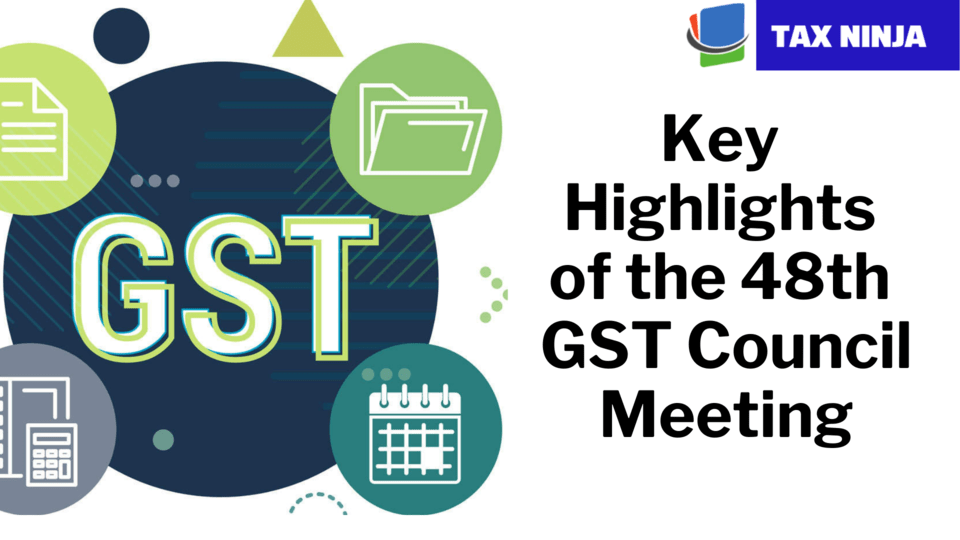The GST Council held its last meeting for the year after a long gap since the last 47th GST Council meeting, and thus it had 15 items on the Council's agenda. However, due to time constraints, only eight points were discussed, and the rest of the agenda, including setting up of GST appellate tribunal and GST on tobacco and gutka, was deferred for a later meeting.
Key Highlights of the 48th GST Council Meeting are as follows:
- Decriminalization under GST: Three kind of offences (viz. obstruction of officer in discharge of his duties, tempering of evidence and failure to supply the information) have been decriminalised under GST.
- The minimum threshold of tax amount for launching prosecution under GST has been increased from Rs. One Crore to Rs. Two Crores, except for the offence of issuance of invoices without supply of goods or services or both.
- Change in the range of the compounding rate from the current 50% to 150% of tax amount to the range of 25% to 100%.
- GST Rates on husk of pulses including chilka and concentrates reduced from 5% to Nil and GST on Ethyl alcohol supplied to refineries for blending with petrol reduced to 5% from 18%.
- Clarified that no GST is payable where the residential dwelling is rented to a registered person if it is rented it in his/her personal capacity for use as his/her own residence and on his own account and not on account of his business.
- Clarified that incentive paid to banks by Central Government under the scheme for promotion of RuPay Debit Cards and low value BHIM-UPI transactions are in the nature of subsidy and thus not taxable.
- Clarified the applicability of cess of 22% on SUVs if it fulfills all four conditions : popularly known as SUV, has engine capacity exceeding 1500 cc, length exceeding 4000 mm and a ground clearance of 170 mm or above.
- Proposed amendment to provide procedure for claiming refund of tax borne by the unregistered buyers in cases where the contract/agreement for services is cancelled and the time period of issuance of credit note by the concerned supplier is over.
- Allowing unregistered suppliers and composition taxpayers to make intra-state supply of goods through E-Commerce Operators (ECOs). However, council has recommended that the scheme may be implemented w.e.f. 01.10.2023.
- Paras 7, 8(a) and 8(b) inserted in Schedule III of CGST Act, 2017 (with effect from 01.02.2019) through which certain transactions/activities are excluded from the purview of GST shall be made effective retrospectively from 1st July, 2017. However, no refund of tax paid shall be available in cases where any tax has already been paid in respect of such transactions.
- Rule 37(1) of CGST Rules, 2017 to be retrospectively amended w.e.f. 1st October, 2022 to provide for reversal of input tax credit only proportionate to the amount not paid to the supplier vis a vis the value of the supply, including tax payable.
- Rule 37A to be inserted to prescribe the mechanism for reversal of input tax credit by a registered person in the event of non-payment of tax by the supplier by a specified date and mechanism for re-availment of such credit, if the supplier pays tax subsequently.
- Circular to be issued to clarify that No Claim Bonus offered by the insurance companies to the insured is an admissible deduction for valuation of insurance services.
- Issuance of the following circulars :
(a) Procedure for verification of input tax credit in cases involving difference in input tax credit availed in FORM GSTR-3B vis a vis that available as per FORM GSTR-2A during FY 2017-18 and 2018-19.
(b) Clarifying the manner of re-determination of demand in terms of sub-section (2) of section 75 of CGST Act, 2017.
(c) Clarification in respect of applicability of e-invoicing with respect to an entity.
Measures for streamlining compliances in GST:
- Proposal to conduct a pilot in State of Gujarat for Biometric-based Aadhaar authentication and risk-based physical verification of registration applicants.
- PAN-linked mobile number and e-mail address (fetched from CBDT database) to be captured and recorded in FORM GST REG-01 and OTP-based verification to be conducted at the time of registration to restrict misuse of PAN.
- Section 37, 39, 44 and 52 of CGST Act, 2017 to be amended to restrict filing of returns/ statements to a maximum period of three years from the due date of filing of the relevant return / statement.
- FORM GSTR-1 to be amended to provide for reporting of details of supplies made through ECOs, covered under section 52 and section 9(5) of CGST Act, 2017.
- Rule 88C and FORM GST DRC-01B to be inserted in CGST Rules, 2017 for intimation to the taxpayer, by the common portal, about the difference between liability reported by the taxpayer in FORM GSTR-1 and in FORM GSTR-3B for a tax period, where such difference exceeds a specified amount and/ or percentage, for enabling the taxpayer to either pay the differential liability or explain the difference.
- Amendment in definition of “non-taxable online recipient” and definition of “Online Information and Database Access or Retrieval Services (OIDAR)” so as to reduce interpretation issues and litigation on taxation of OIDAR Services.

